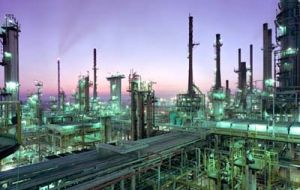MercoPress. South Atlantic News Agency
Argentina announces 2.3-billion-dollar fuel refinery project

In an effort to offset expected shortages in diesel fuel supplies, the Argentine government has announced a project to build a refinery that will require an about 2.3-billion-dollar investment which will be mainly made by some 30 private oil companies, with the exception of Royal/Dutch Shell, which is engaged in a dispute with the administration.
Fuel Secretary Cristian Folgar said earlier this week that of the total investment required, oil firms would provide about 1.6 billion dollars while investment banks and other investors such as the AFJPs pension funds would account for the balance. The refinery which has already started to be called General Mosconi II would have a refining capacity of two to three million cubic metres of diesel fuel a year. The details of the project were agreed with Federal Planning Minister Julio De Vido, Domestic Trade Secretary Guillermo Moreno and representatives from Spain's Repsol-YPF, Brazil's Petrobras Energía, and US companies Pan American Energy, Chevron and Esso SAPA. The state will make no investment in the project, which will be operated by the oil companies, Folgar said. He estimated the completion of the project at about two to two-and-a-half years. The location will be decided at a later stage. There has been speculation in the sector that the new plant could be located in Comodoro Rivadavia (in Chubut province) or Bahía Blanca, in Buenos Aires province. "Such a large and complex project requires deep analysis," Esso's Director Tomás Hess was quoted as saying. "We have received it, we participated in meetings with Secretary Moreno and we are studying it, among other alternatives that may allow an adequate supply of diesel fuel to the market." His view was reportedly shared by other large oil firms. Folgar said that the private companies have already a shortlist of consultant firms among which they will choose one before February 15 for the engineering fine-tuning. "We will build a new refinery because not only we need more diesel fuel. Argentina is currently exporting crude oil and a refinery would allow us to also export by-products, which have much more added value," he said. Since a crippling five-year recession that ended in 2002, Argentina has been facing energy shortages that forced it to import energy from Venezuela, Brazil and Bolivia, and even sparked a dispute with Chile over Argentine gas supplies. Argentina also reduced gas supplies to Uruguay. Argentina produces some 12 million of cubic metres of diesel fuel a year but consumes 13 million, forcing companies to make costly imports as international prices are higher than the domestic ones. The country in mid 2006 suffered diesel fuel supplies and private experts predict that more shortages will occur in 2007 as early as March, precisely when the grain harvest starts. The diesel fuel shortage caused tensions with farmers and also led the government to impose a 23 million-peso fine to Shell in early December, on charges that the company failed to duly supply service stations. Shell denied the charges and appealed the fine. The government also launched investigation of other oil firms. Shell will be the only company that will not take part in the new refinery project, Folgar said. "In view of the things that it has been doing as of lately it excluded itself from the project." The company argues that it has not been invited to participate. Shell said that Domestic Trade Secretariat's Resolution 25/06 on fuel supplies, which the government alleges that the firm has violated, actually doesn't set a minimum supply for each and every day but a minimum for the month as a whole. "The 20 service stations questioned and fined had been supplied sufficiently and even above the standards set by the resolution," Shell said in a statement. In March, after Shell raised fuel prices, President Néstor Kirchner urged the public not to buy fuel from the company. During the annual meeting of the Petroleum and Gas Argentine Institute (IAPG) in December, a former IAPG president said that Shell was being discriminated by the government. He received a strong applause. According to some reports the oil firms are not happy with the new refinery project, arguing that it would only be profitable if the government allows an increase in prices. However, the companies allegedly chose to buy time and avoid a possible dispute with the government. Argentina is due to hold presidential elections next October and many observers expect Kirchner to seek reelection. Folgar didn't rule out the possibility that Venezuela's state-run oil firm PDVSA could take part in the refinery. "The relationship between the Argentine government and PDVA is very good and of course that if they are interested in the project the doors will be open fro them." Venezuelan President Hugo Chávez is a strong ally of President Kirchner. (MercoPress â€" Guillermo Háskel â€" Buenos Aires)




Top Comments
Disclaimer & comment rulesCommenting for this story is now closed.
If you have a Facebook account, become a fan and comment on our Facebook Page!